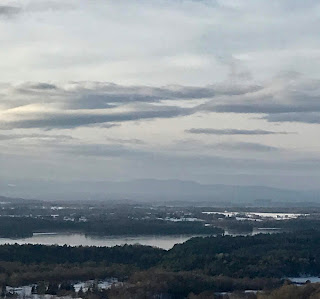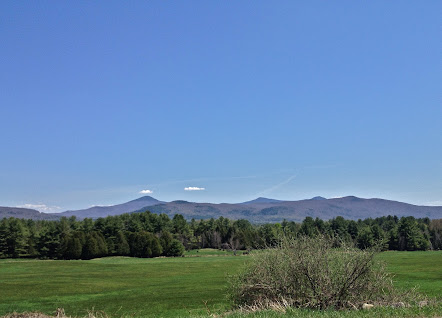 |
| November 24, 2018 |
P. M. — To Cliffs and Walden.
There is a slight sugaring of snow on the ground. On grass ground there is much the less, and that is barely perceptible, while plowed ground is quite white, and I can thus distinguish such fields even to the horizon. It is dark, drizzling still from time to time, sprinkling or snowing a little. I see more snow in the north and north west horizon. I can not only distinguish plowed fields — regular white squares in the midst of russet — but even cart-paths, and foot or cow paths a quarter of a mile long, as I look across to Conantum. It is pleasant to see thus revealed as a feature, even in the distant landscape, a cow-path leading from far inland down to the river.
The young oaks on the plain under the Cliffs are of a more uniform color than a fortnight ago, — a reddish brown.
Fair Haven Pond is closed still.
It is a lichen day, with a little moist snow falling. The great green lungwort lichen shows now on the oaks, — strange that there should be none on the pines close by, —and the fresh bright chestnut fruit of other kinds, glistening with moisture, brings life and immortality to light. That side of the trunk on which the lichens are thickest is the side on which the snow lodges in long ridges.
When I looked out this morning, the landscape presented a very pretty wintry sight, little snow as there was. Being very moist, it had lodged on every twig, and every one had its counterpart in a light downy white one, twice or thrice its own depth, resting on it.
I hear a screech owl in Wheeler’s wood by the railroad, and I heard one a few evenings ago at home.
Saw a scarlet oak some sixteen inches in diameter at three feet from ground blown down evidently in that southeast wind some months ago. It stood on the southerly edge of Wheeler’s wood, and had fallen north-north west, breaking off a white oak nine inches in diameter and a small white pine in its fall. It was a perfectly sound oak. I was surprised to see how little root it had. Very few roots reached deeper than two feet, — the thickness of the crust of earth turned up by its fall,— and those that did were not bigger than one’s finger; and there was not a root bigger than your finger at four feet from the centre on any side of the more than semi circle exposed. No wonder it was uprooted!
Here is an author who contrasts love for “the beauties of the person” with that for “excellences of the mind,” as if these were the alternatives. I must say that it is for neither of these that I should feel the strongest afiection. I love that one with whom I sympathize, be she “beautiful” or otherwise, of excellent mind or not.
H. D. Thoreau, Journal, November 24, 1858
When I looked out this morning, the landscape presented a very pretty wintry sight . . . it had lodged on every twig See November 13, 1858 (“We looked out the window at 9 P. M. and saw the ground for the most part white with the first sugaring, which at first we could hardly tell from a mild moonlight, — only there was no moon. Thus it comes stealthily in the night and changes the whole aspect of the earth.”)
Plowed ground is quite white. See November 24, 1860 (“The plowed fields were for a short time whitened”) See also October 19, 1854 (“The country above Littleton (plowed ground) more or less sugared with snow,”); November 8, 1853 ("The snow begins to whiten the plowed ground now, but it has not overcome the russet of the grass ground.") December 16, 1857 ("Plowed grounds show white first.”);
Even cart-paths, and foot or cow paths a quarter of a mile long. See February 16, 1854 ("That Indian trail on the hillside about Walden is revealed with remarkable distinctness to me standing on the middle of the pond, by the slight snow which had lodged on it forming a clear white line unobscured by weeds and twigs. (For snow is a great revealer not only of tracks made in itself, but even in the earth before it fell.) It is quite distinct in many places where you would not have noticed it before. A light snow will often reveal a faint foot or cart track in a field which was hardly discernible before, for it reprints it, as it were, in clear white type, alto-relievo.”)
It is lichen day. See December 31, 1851 ("Nature has a day for each of her creatures, her creations. To-day it is an exhibition of lichens at Forest Hall.”); February 5, 1853 ("It is a lichen day. . . . All the world seems a great lichen and to grow like one to-day, - a sudden humid growth.”);January 7, 1855 (“It is a lichen day. . . . How full of life and of eyes is the damp bark!”); January 26, 1858 (“This is a lichen day. The white lichens, partly encircling aspens and maples, look as if a painter had touched their trunks with his brush as he passed”) January 26, 1852 ("The lichens look rather bright to-day, . . .The beauty of lichens, with their scalloped leaves, the small attractive fields, the crinkled edge! I could study a single piece of bark for hour.”);
Being very moist, it had lodged on every twig, and every one had its counterpart in a light downy white one, twice or thrice its own depth, resting on it. See January 14, 1853 ("White walls of snow rest on the boughs of trees, in height two or three times their thickness.”); December 26, 1853 ("It has fallen so gently that it forms an upright wall on the slenderest twig”); December 24, 1856 ("The snow collects and is piled up in little columns like down about every twig and stem, and this is only seen in perfection, complete to the last flake, while it is snowing, as now.”); March 2, 1858 (“ the snow is quite soft or damp, lodging in perpendicular walls on the limbs, white on black.”)
I hear a screech owl in Wheeler’s wood by the railroad. See September 23, 1855 (" I hear from my chamber a screech owl about Monroe’s house this bright moonlight night, — a loud, piercing scream, much like the whinny of a colt perchance, a rapid trill, then subdued or smothered a note or two.”) August 14, 1854 (“I hear the tremulous squealing scream of a screech owl in the Holden Woods.”); June 2, 1860 ("I soon hear its mournful scream. . . not loud now but, though within twenty or thirty rods, sounding a mile off.”); June 25, 1860 ("At evening up the Assabet hear four or five screech owls on different sides of the river, uttering those peculiar low screwing or working, ventriloquial sounds.”)
Plowed ground is quite white. See November 24, 1860 (“The plowed fields were for a short time whitened”) See also October 19, 1854 (“The country above Littleton (plowed ground) more or less sugared with snow,”); November 8, 1853 ("The snow begins to whiten the plowed ground now, but it has not overcome the russet of the grass ground.") December 16, 1857 ("Plowed grounds show white first.”);
Even cart-paths, and foot or cow paths a quarter of a mile long. See February 16, 1854 ("That Indian trail on the hillside about Walden is revealed with remarkable distinctness to me standing on the middle of the pond, by the slight snow which had lodged on it forming a clear white line unobscured by weeds and twigs. (For snow is a great revealer not only of tracks made in itself, but even in the earth before it fell.) It is quite distinct in many places where you would not have noticed it before. A light snow will often reveal a faint foot or cart track in a field which was hardly discernible before, for it reprints it, as it were, in clear white type, alto-relievo.”)
It is lichen day. See December 31, 1851 ("Nature has a day for each of her creatures, her creations. To-day it is an exhibition of lichens at Forest Hall.”); February 5, 1853 ("It is a lichen day. . . . All the world seems a great lichen and to grow like one to-day, - a sudden humid growth.”);January 7, 1855 (“It is a lichen day. . . . How full of life and of eyes is the damp bark!”); January 26, 1858 (“This is a lichen day. The white lichens, partly encircling aspens and maples, look as if a painter had touched their trunks with his brush as he passed”) January 26, 1852 ("The lichens look rather bright to-day, . . .The beauty of lichens, with their scalloped leaves, the small attractive fields, the crinkled edge! I could study a single piece of bark for hour.”);
Being very moist, it had lodged on every twig, and every one had its counterpart in a light downy white one, twice or thrice its own depth, resting on it. See January 14, 1853 ("White walls of snow rest on the boughs of trees, in height two or three times their thickness.”); December 26, 1853 ("It has fallen so gently that it forms an upright wall on the slenderest twig”); December 24, 1856 ("The snow collects and is piled up in little columns like down about every twig and stem, and this is only seen in perfection, complete to the last flake, while it is snowing, as now.”); March 2, 1858 (“ the snow is quite soft or damp, lodging in perpendicular walls on the limbs, white on black.”)
I hear a screech owl in Wheeler’s wood by the railroad. See September 23, 1855 (" I hear from my chamber a screech owl about Monroe’s house this bright moonlight night, — a loud, piercing scream, much like the whinny of a colt perchance, a rapid trill, then subdued or smothered a note or two.”) August 14, 1854 (“I hear the tremulous squealing scream of a screech owl in the Holden Woods.”); June 2, 1860 ("I soon hear its mournful scream. . . not loud now but, though within twenty or thirty rods, sounding a mile off.”); June 25, 1860 ("At evening up the Assabet hear four or five screech owls on different sides of the river, uttering those peculiar low screwing or working, ventriloquial sounds.”)


No comments:
Post a Comment